A new smart phone
might not be the best festive offering, unless you also plan to cover some or
all of the gadget’s hefty monthly bills. Yet phone sales are sure to surge this
holiday season, thanks in part to people treating themselves to the new iPhone
5 or another of the recommended phones in the Ratings bellows
Look for these trends
Here’s what’s new in
phone shape, size, connectivity, and more
Screens
are bigger and less square.
The iPhone 5 finally
brought Apple into the fold of 5-inch and larger screens. Most top-rated smart
phones now have screens measuring upward of 4.3 inches diagonally, providing
extra real estate for viewing Web pages, maps, and more.
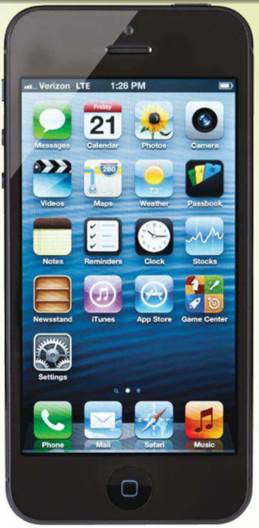
The iPhone 5 performed superbly in our tests.
It’s Apple’s best phone yet.
Further, more of those
screens than ever have high-definition 720p resolution for easier viewing and
reading of Web pages and e-mail. And some models, including the iPhone 5, have
a screen with a rectangular, 16:9 aspect ratio that’s well-suited for viewing
video in landscape mode.
Designers haven’t
forgotten about usability, though. Many models are less than a half-inch thick
and ultra-light- 5 ounces or less- so they’re comfortable to hold and slide
easily in and out of most pockets.
But a few phones with
5-inch-plus screens, including the Samsung Note, may be too big for many hands
and pockets. They do, though, offer a middle ground between phones and tablets,
and offer extras such as a stylus to handwrite notes, draw pictures, or play
games.
Look
beyond Apple and Samsung.
However justified the
buzz around Apple and Samsung phones, don’t overlook the best models from other
makers. In addition to fine performance, as detailed in the Ratings, they offer
innovations. Verizon’s Motorola Razr phones, for example, have some nifty apps
that will automatically change their settings according to the time of day,
your activity, or your location. And HTC’s One Series phones have superbly
intuitive interfaces that allow you to access core features quickly.
4G is now
the norm.
With the exception of
Apple’s iPhone 4S on Verizon and Sprint, every recommended phone connects to a
high-speed fourth-generation data network. Phones can use more juice when
running on 4G, so manufacturers have compensated with higher-capacity batteries
and more sophisticated power management. Some 4G phones let you switch to a
slower-speed network to conserve power.
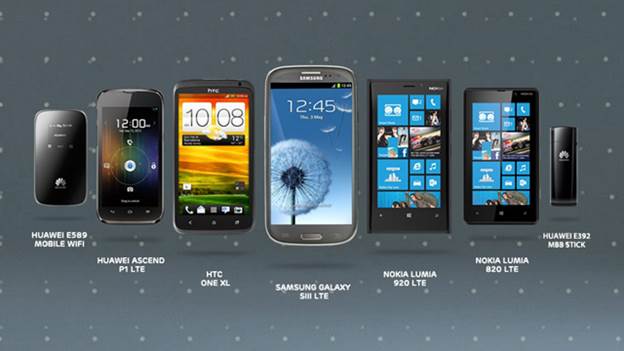
Some 4G phones let you switch to a
slower-speed network to conserve power.
One caution: A faster
4G connection may encourage you to consume more data, which might drive up your
monthly bills.
Ratings Smart Phones: Recommended models only from 59
tested. In performance order, by carrier.
Overview
While our Ratings
group phones by carrier, we’ve highlighted the recommended phones below by
other considerations. For phones that come in 15GB and 32GB capacities, the
price is for the storage size we tested. Prices are for a two-year contract,
including rebates. (Carriers are listed in order of user satisfaction.)
Big-Screen,
big performance
A2: Samsung Galaxy
SIII (Verizon, 32GB) $250
B1: Samsung Galaxy S
III (Sprint, 16GB) $200
B3: HTC Evo 4G LTE
(Sprint) $200
D1: Samsung Galaxy S
III (AT&T, 16GB) $200
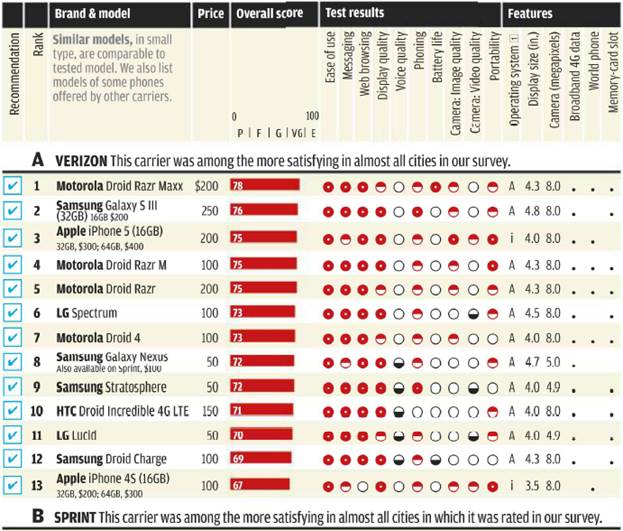
A. Verizon: This carrier was among the
more satisfying in almost all cities in our survey.

A1. Motorola Droid Razr Maxx
These phones deftly
combine a superb screen that’s big (4.7 inches of B3, 4.8 inches for the rest)
but not enormous, with to-notch performance and some of the most innovative technologies
on the Android platform. All allow you to launch the camera or messaging from a
locked screen, which is handy. They also have cameras with advanced features.
Including the ability to snap a still while continuing to shoot a video, and
take very good photos (except for B3, whose photos are only fair). The Samsungs
(A2, B1, D1) have front-facing cameras that monitor your eyes while you’re feeding
a Web page or other document to prevent the screen form timing out; let you
minimize a video playing on the phone’s large screen so that you can perform
other tasks, such as browse the Web or reply to e-mail; and offer myriad
options for wirelessly sharing their content with other devices.
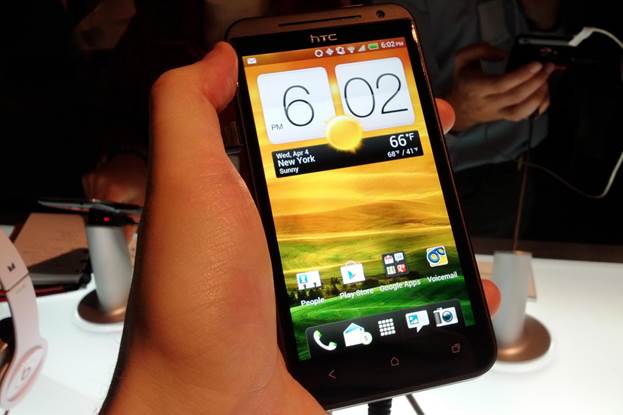
B3. HTC Evo 4G LTE
Compact high
performers
A3: Apple iPhone 5 (Verizon,
16GB) $200
B2: Apple iPhone 5
(Sprint, 16GB) $200
D2: Apple iPhone 5
(AT&T, 16GB) $200
A4: Motorola Droid
Razr M (Verizon, $100)
C2: HTC One S
(T-Mobile, $0)

B. Sprint: this carrier was among the
more satisfying in almost all cities in which it was rated in our survey
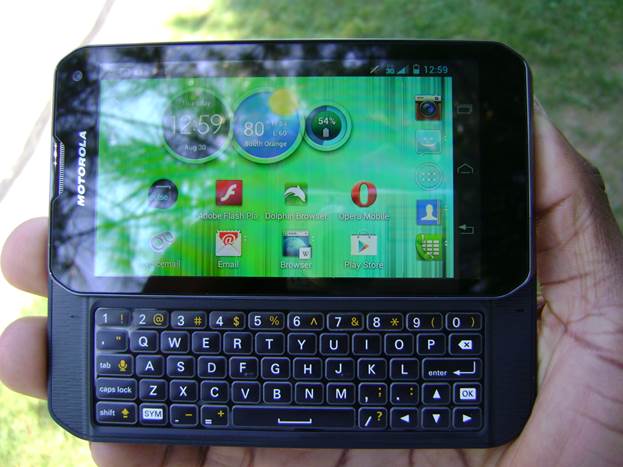
B4. Motorola Photo Q 4G LTE
These are ideal
choices if you want top performance in a smaller package. A4 and C2 have
high-resolution, 4.3-inch screens; the iPhone 5 (A3, B2, D2) has a 4-inch
display. The free new Apple Maps app for iPhone 5 and other iPhones using iOS6,
gives clear guidance in a streamlined interface but offers fewer details and
options than the free Google navigation on Android phones. Other than the lower
price, there’s little reason to consider the iPhone 4S (A13, B6, D9). Apple’s
newest phone has the first smart-phone camera we’ve tested that yields
excellent still photos and very good video, and its superb Siri voice assistant
now works with apps, too. But unlike other 4G Verizon and Sprint smart phones,
A3 and B2 can’t simultaneously support a phone call and an Internet-based
connection over the cellular network. That makes D2 arguably the best iPhone 5
for multitasks, despite the track record of AT&T service in our surveys. A4
may not be as thin as its sibling A5 or have A1’s marathon battery life, but it
managed to squeeze the same large, 4.3-inch display into a much more
palm-friendly case and delivers the same high level of performance and convenient
features. The thin, lightweight C2 has an especially intuitive interface. On
all of these phones, the camera lets you snap a still while shooting a video.

C. T-Mobile: this carrier was among the
more satisfying in almost all cities in which it was rated in our survey
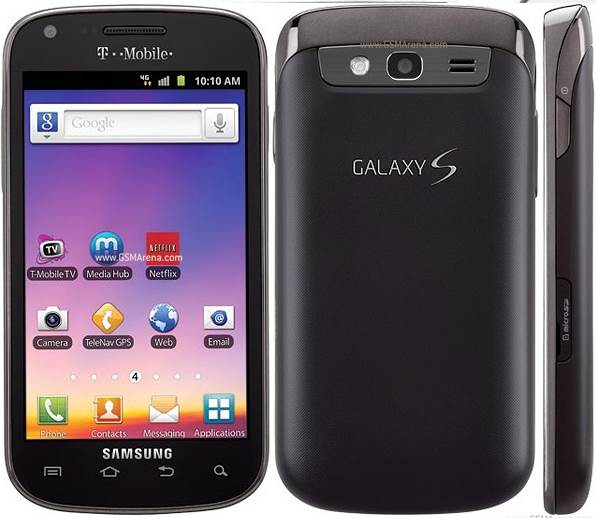
C4. Samsung Galaxy S blaze 4G
Best for
long battery life
A1: Motorola Droid
Razr Maxx (Verizon) $200
This is a marathon
performer, thanks to one of the largest-capacity batteries ever squeezed into a
smart phone. It delivered 13.25 hours of talk time on a single charge in our
tests. In other respects, this phone is nearly identical to A5, though the
beefier battery makes it slightly thicker and heavier. (A new version, the
Droid Razr HD Maxx, is expected by year’s end)
For a
tablet alternative
D5: Samsung Galaxy
Note (AT&T) $200
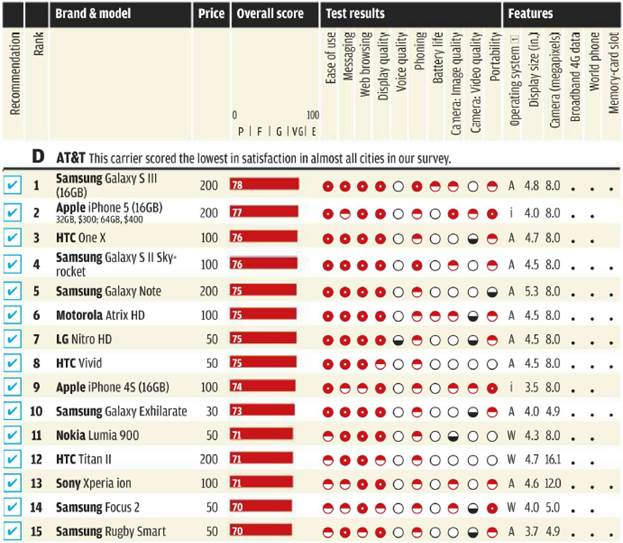
D. AT&T: This carrier scored the
lowest in satisfaction in almost all cities in our survey
With its 5.3-inch
screen, this Samsung will strain some pockets, and even those with large hands
will struggle with one-handed operation. But the phone’s large display,
offering top-notch performance even in bright light, makes it a compelling
choice for e-book fans and heavy Web users who don’t also tote a tablet around.
The included S Pen stylus allows you to jot down notes or sketches on the memo
app and crop photos by simply tracing over them. (The even bigger Samsung Note
II, with a 5.5-inch screen, was expected to go on the market in late October).

D5: Samsung Galaxy Note (AT&T)
Best
choices with a keyboard
A7: Motorola Droid 4
(Verizon) $100
A9: Samsung
Stratosphere (Verizon) $50
B4: Motorola Photon Q
4G LTE (Sprint) $200
These are fine choices
for serious typists frustrated by virtual touch-screen keyboards. The slide-out
keyboards of these phones are among the best we’ve seen. They’re clearly labeled
and logically laid out and have five rows, with dedicated buttons for numbers
across the top row. Their keyboards have directional buttons for more-precise
Web scrolling and cursor placement. A9 also has a button for inserting
emoticons into text and instant messages.
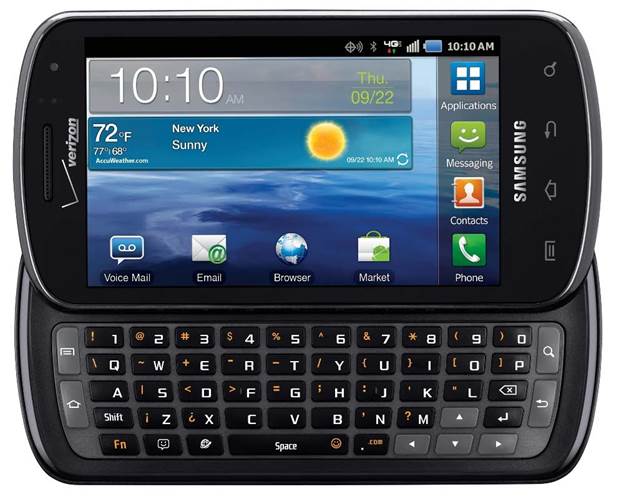
A9: Samsung Stratosphere (Verizon) $50
New Windows Phone 8 operating system packs new features
It’s new to tablets
and computers, but the tiled interface of Microsoft’s just-launched Windows 8
operating system will be familiar to owners of Windows Phone 7 smart phones.
Windows Phone 8,
however, gives the tiles some new tricks. You can vary their size and shape, or
program them to allow one-tap access to a friend’s latest e-mails, texts, and
social-media posts. The new operating system also gives Windows phones a free
built-in navigation app with spoken, turn-by-turn directions.
The New Windows phones,
in turn, promise to bring to Microsoft’s platform the top-notch performance and
features previously found only on phones that run on the Android or Apple iOS
operating systems. Here are two of the first, and highly anticipated, models,
expected before the end of this year.
Nokia Lumia
920

This phone has a
4.5-inch high-definition display and an advanced 8.7-megapixel camera that
allows you to add animation to still images and to edit out people-remove the
tourists, say, from a shot of the Eiffel Tower. Also, the screen responds to
even a gloved finger and the battery can be charged wirelessly, using
induction.
HTC
Windows Phone 8X
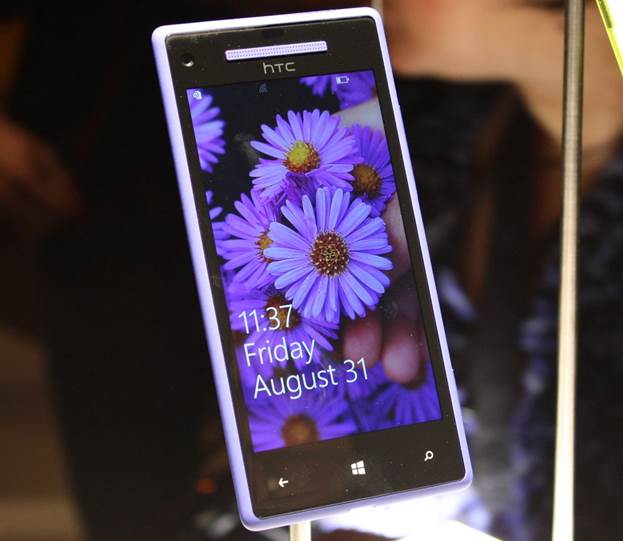
Equipped with a
4.3-inch, high-definition display, this models also has an advanced
ultra-wide-angle front camera, which HTC says can capture three times the area
of most other front cameras. Other innovations: a built-in audio amplifier
designed to improve sound quality for listening to music.